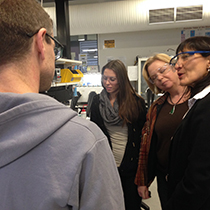Deakin’s Australian Laureate Fellow to help improve science teacher training
Media releaseResearch carried out by Deakin University Australian Laureate Fellow Professor Maria Forsyth and her team at the Institute for Frontier Materials (IFM) will play a key role in improving the training of tomorrow's teachers.
The project, Reconceptualising Mathematics and Science Teacher Education Programs (REMSTEP) is housed at the University of Melbourne and involves Deakin University researchers Professor Russell Tytler, Associate Professor Peter Hubber and Associate Professor Stuart Palmer as well as research teams from Monash and La Trobe Universities and industry partners including BioLab and the Melbourne Museum.
It has been funded by the Chief Scientist through the Office for Learning and Teaching and aims to take a fresh look at the university curriculum and how it prepares teaching students to teach science in an engaging way. The project is a key plank in addressing the decline in the numbers of high school and primary school students pursuing science and maths.
For Professor Forsyth, a self-confessed maths and science geek the project is very close to her heart. Professor Forsyth is Chair in Electromaterials and Corrosion Science and Director of the ARC Centre of Excellence for Electromaterials Science (ACES) in IFM at Deakin's Burwood Campus
"I always liked maths and science at Year 9 and it was the teachers who inspired me to learn and made me want to go further," she said.
"I went to university to do a double degree in maths and engineering -the maths for fun and engineering for a job, but I decided I really liked chemistry.
"I got a vacation job in chemistry and thought that was it, I want to do research."
Professor Forsyth has been a key force behind the institute's outreach activities with students.
"The problem is you can only reach a handful of kids so what we need to do is get teachers more enthusiastic and see the relevance of science in what they are teaching in the real world."
Professor Tytler said the reality is that science, mathematics and technology have a ubiquitous role across our lives.
"There are many human activities and problems, such as the use of energy, global warming and health and medical care where understanding them requires at least a basic scientific and technological knowledge and confidence," he said.
"Economically as well, we need an ever-growing proportion of the workforce to have quantitative, modelling and problem solving skills and basic scientific knowledge.
"This means that academic and vocational programs need to be strong in science, technology, maths and engineering skills."
Professor Tytler, who co-authored a key report for Professor Chubb looking at Australian's participation and competencies in Science, Technology, Engineering and Maths (STEM) against 26 comparison countries, said ensuring teachers were suitably prepared to teach the subjects in an engaging way was one solution to increasing the numbers of students studying science and maths.
"Deakin has led the way as far as this is concerned, developing school programs where students have to solve problems and think critically, building their confidence in the subject as well as building these skills in others," he said.
Associate Professor Hubber said the researchers would be looking at the work which was carried out by scientists and seeing how it could be 'boxed up' into the curriculum for pre-service teachers.
"We also want to look at the possibility of engaging scientists from within each of the universities' science faculties," he said.
Associate Professor Stuart Palmer, from the University's Faculty of Science, Engineering and the Built Environment said so much of the practice of modern engineering and science is based on the modelling of physical phenomena and processes.
"Competent and effective science and technology practitioners need to be well-equipped with mathematical skills, and a solid foundation for this needs to be laid in school for those students aspiring to have a career in those areas."
Share this story
 Professor Maria Forsyth discusses the work at the Institute of Frontier Materials.
Professor Maria Forsyth discusses the work at the Institute of Frontier Materials.
